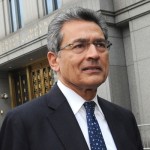 Perhaps Boards Need Fewer Famous and Iconic Board Members. In its account of the verdict in the conviction of Rajat Gupta, the former head of McKinsey & Co, and a former director of Goldman Sachs and Procter & Gamble for securities fraud and conspiracy to share confidential information, the Wall Street Journal noted, Gupta was “once one of America’s most-respected corporate directors, was motivated not by quick profits but rather a lifestyle where inside tips are the currency of friendships and elite business relationships.”
Perhaps Boards Need Fewer Famous and Iconic Board Members. In its account of the verdict in the conviction of Rajat Gupta, the former head of McKinsey & Co, and a former director of Goldman Sachs and Procter & Gamble for securities fraud and conspiracy to share confidential information, the Wall Street Journal noted, Gupta was “once one of America’s most-respected corporate directors, was motivated not by quick profits but rather a lifestyle where inside tips are the currency of friendships and elite business relationships.”
Perhaps Boards Need Fewer Famous and Iconic Board Members
The government’s prosecution of such an iconic leader, says that such an insider mentality and breach of responsibility will not be tolerated. He was a figure of trust. His conviction emphasizes the importance of board members who are trustworthy and behave ethically. Directorships are not honorariums to be awarded to those who have been successful in business or government. If there is a separate set of rules for the elite and famous, then average investors have no reason to invest. That’s why trust is so critical. Shareholders must trust that all investors will be treated fairly. Ethical behavior by directors and management is critical to the operations of the free market.